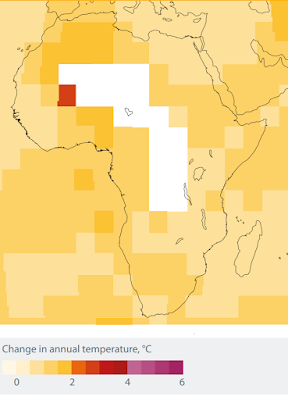Climate Change in Africa: An Introduction
It seems as if it is becoming common knowledge that the world is warming at an unprecedented rate - of course, some people do not agree. The facts, however, prove President Trump wrong: according to NASA (2017), 2016 was the hottest world on record, with global average surface temperatures being 0.99 degrees Celsius warmer compared to the mid-twentieth century mean. Unfortunately, this finding follows a long-term warming trend; since the mid-nineteenth century, there has been a 0.85 degrees Celsius rise in the Earth’s surface temperature (IPCC, 2014).
Significantly, Africa is considered to be the continent most at risk to the impacts of climate change (IPCC, 2014; Niang et al., 2014). There is now strong evidence that suggests Africa has warmed over the last 50 to 100 years: surface temperatures have risen by 0.5 to 2 degrees Celsius over the past 100 years (Figure 1) and it is likely that this warming trend will continue (IPCC, 2014). With this warming comes a myriad of climate change impacts for Africa, including intensified drought, flooding and storms, rise in sea level, alterations in the distribution and yields of agricultural crops, and changes in the occurrence of vector-borne diseases (Adenle et al., 2017).
Africa has a population of over 1.2 billion and is regarded to be the fastest growing continent in the world, projected to contribute to more than half of the world's population growth between now and 2050 (UN, nd). Increased demand for freshwater due to this rapid growth in addition to other important issues, such as rapid urbanisation and land-use change, is expected to exacerbate climate change's threat to freshwater security (Niang et al., 2014).
This blog aims to explore how climate change, specifically its impact on precipitation, is predicted to affect Africa's freshwater scarcity. I plan to further discuss the implications this has on livelihoods and development through the impeded access to basic needs, and then to debate the different adaptation strategies that can be adopted to increase resilience in a changing climatic world.
Significantly, Africa is considered to be the continent most at risk to the impacts of climate change (IPCC, 2014; Niang et al., 2014). There is now strong evidence that suggests Africa has warmed over the last 50 to 100 years: surface temperatures have risen by 0.5 to 2 degrees Celsius over the past 100 years (Figure 1) and it is likely that this warming trend will continue (IPCC, 2014). With this warming comes a myriad of climate change impacts for Africa, including intensified drought, flooding and storms, rise in sea level, alterations in the distribution and yields of agricultural crops, and changes in the occurrence of vector-borne diseases (Adenle et al., 2017).
 |
| Figure 1: Change in annual temperature across Africa, 1901-2012 (IPCC, 2014) |
Africa has a population of over 1.2 billion and is regarded to be the fastest growing continent in the world, projected to contribute to more than half of the world's population growth between now and 2050 (UN, nd). Increased demand for freshwater due to this rapid growth in addition to other important issues, such as rapid urbanisation and land-use change, is expected to exacerbate climate change's threat to freshwater security (Niang et al., 2014).
This blog aims to explore how climate change, specifically its impact on precipitation, is predicted to affect Africa's freshwater scarcity. I plan to further discuss the implications this has on livelihoods and development through the impeded access to basic needs, and then to debate the different adaptation strategies that can be adopted to increase resilience in a changing climatic world.
I look forward to understanding the complex nature of this issue as I delve deeper!


Comments
Post a Comment